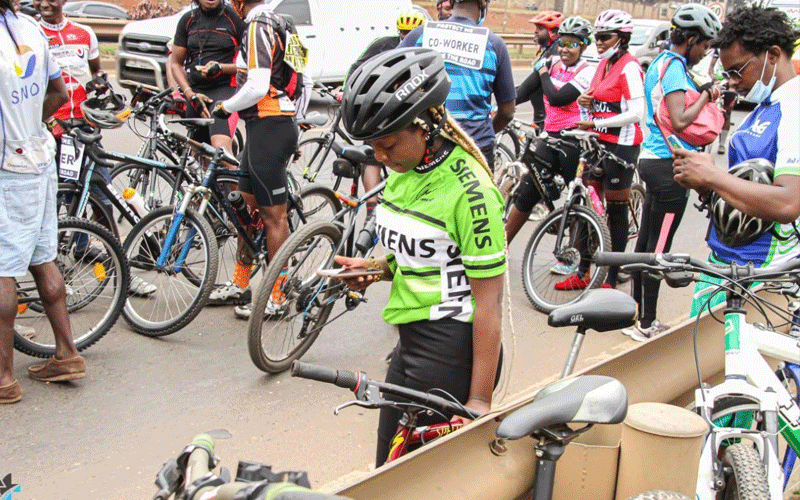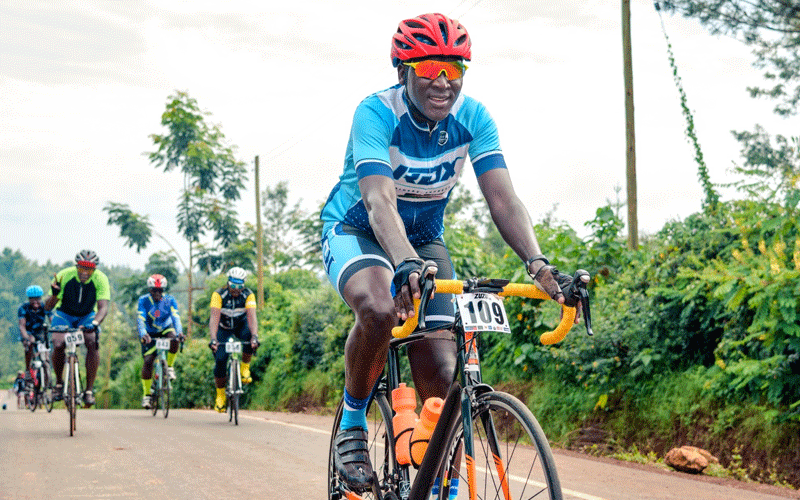Cylists: We deserve respect on the road, stop harassing us
By Adalla Allan, October 2, 2020For the past two weeks, the cyclists’ community in Kenya has come together to fight against the harassment faced from motorists on the roads.
Their concerns come on the heels of the death of their colleague 22-year-old Caleb Omwoyo, a member of RDX riders club who was killed in a grisly road accident last month involving a Kenya Mpya bus.
According to witnesses, the bus stopped abruptly to drop a passenger after overtaking Caleb at high speed.
Due to the short distance between his bike and the bus, he couldn’t swerve or hold the brakes and he hit the back of the bus with force. He died on the spot.
Catherine Wambui, a cyclist and a close friend says Caleb’s death has affected her since they spent most of their time cycling together during the Covid-19 pandemic. She is too traumatised to cycle alone after losing her friend.

“Omwoyo was amongst the male cyclists who used to push me to train. In fact, I encountered my first major accident on Thika road while I was cycling home with Caleb.
The accident involved a matatu. I got minor injuries on the arms and knees, but the bike was extensively damaged, ” she says.
The economics and finance student at Kenyatta University says motorcycles are the major threat to her as they break the traffic rules by using the wrong side of the road.
She also blames the public service vehicle, which intentionally push cyclists out of the road when overtaking.
Wambui began cycling to school two years ago and confesses that her experience on the road is not a walk in the park.
“As a woman, I have gone through different challenges. When motorists realise you are a woman, they will pester you more since they know you cannot take any action.
Some of them hurl insults at us, ” she says.
Stephen Ndege, an official at RDX riders club says he has been an adept cyclist for over 30 years and has fallen victim of harassment on the roads several times.
“In 2008, I was cut off by a vehicle in Kisii while descending down a hill and broke my collarbone.
The driver didn’t indicate that he was turning, he just took me to the hospital gate and left me there,” Ndege narrates.
The second time was in 2018 when I was hit by a motorcycle in Ngara, Nairobi.
The motorcycle rider did not check oncoming traffic before getting on the highway.
For Peter Osoo, a cyclist in Mombasa, his seven years experience cycling from Likoni to Nyali has also been full of disaster.
He points out that Kenyan roads consist of road users with different mindsets — the careless and ignorant ones, the few cautious ones and those who feel entitled.
“Three times I have been involved in minor accidents, the culprits being bodaboda riders and two times with Tuktuk drivers, ” Osoo confides.
Private vehicles feel more entitled on the roads because they have the attitude ‘I am better and important than you’.
“I have had several encounters. One time I was riding along the Mombasa-Malindi highway at the narrow and rough-edged road along VOK area.
A truck was driving on the opposite direction and suddenly a small car was coming at a high speed behind me,” he added.
He thought the driver would be considerate enough to slow down and let the truck pass before overtaking him, but he kept on moving on his side.
“He hit me with his side mirror, but I was lucky because I managed to maintain balance, ” he says.
According to the cyclists, most dangerous road users are the boda boda riders.
“These drivers are always impatient and unpredictable, it’s like we are a nuisance to them on the roads.
When overtaking you, they either shout or hurl obscenities, ” says Alex Njuguna.
However, Winstone Rodney’s case was different. On his way from Waiyaki way to the city centre along University way, he was hit from the back and his bike got stuck under the car.
Looking at the car nameplate, it was a Government vehicle. The driver later ran away after realising that he was the cause of the accident.
Winston’s bike was wrecked, forcing him to carry it home. He says that repairs cost him an arm and a leg.
According to the National Transport and Safety Authority (NTSA) report, in 2019 64 cyclists lost their lives on Kenyan roads as a result of harassment by motorists.
Owuor Otet, a road safety expert says the major cause of accidents on the roads involving cyclists are caused by ignorant motorists.
“It is always advisable for a motorist to look carefully before making any turn or changing lanes.
Before turning out of one road to the other, wait for the cyclist riding along the other road to pass; do not pass in front of them.
“Leave plenty space of at least 1.5 metre when overtaking a cyclist and drive at a considerate speed to allow easy braking—never brake rapidly around cyclists,” Owuor adds.
He says motorists should wait for cyclists to ride through a narrow road before driving past, unless there is enough room to overtake at a safe distance.
Many roads in Kenya are not designed for cycling, further putting their lives in danger.
“It is often better for cyclists (especially faster ones) to ride on the carriageway (at the road sleeve) both for their safety and pedestrians’, ” he explains.
